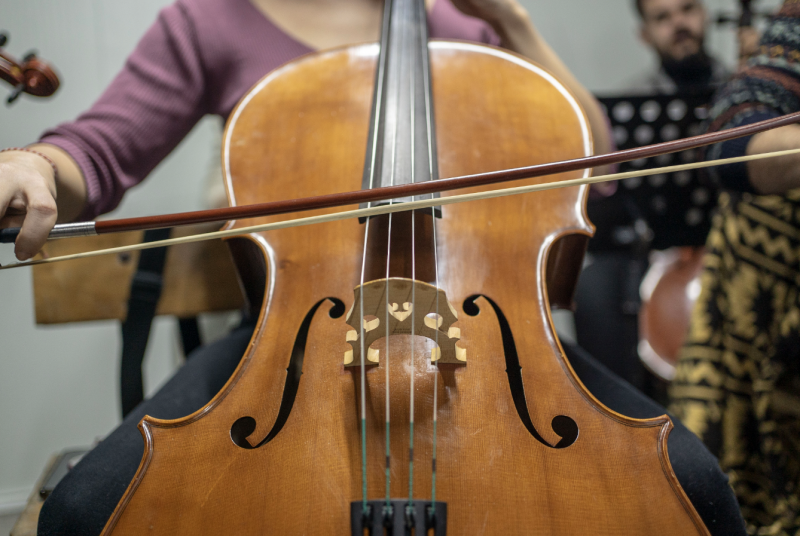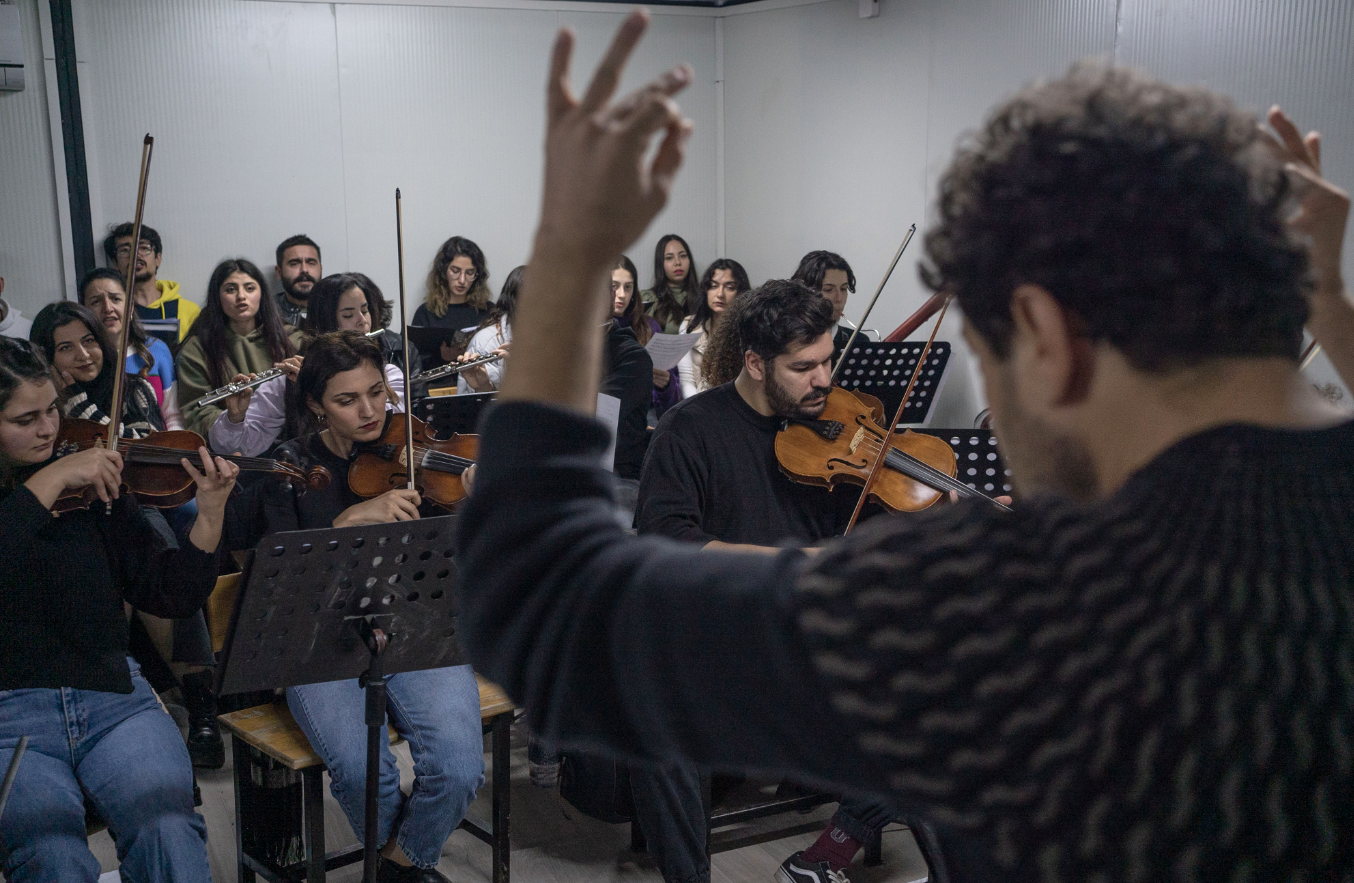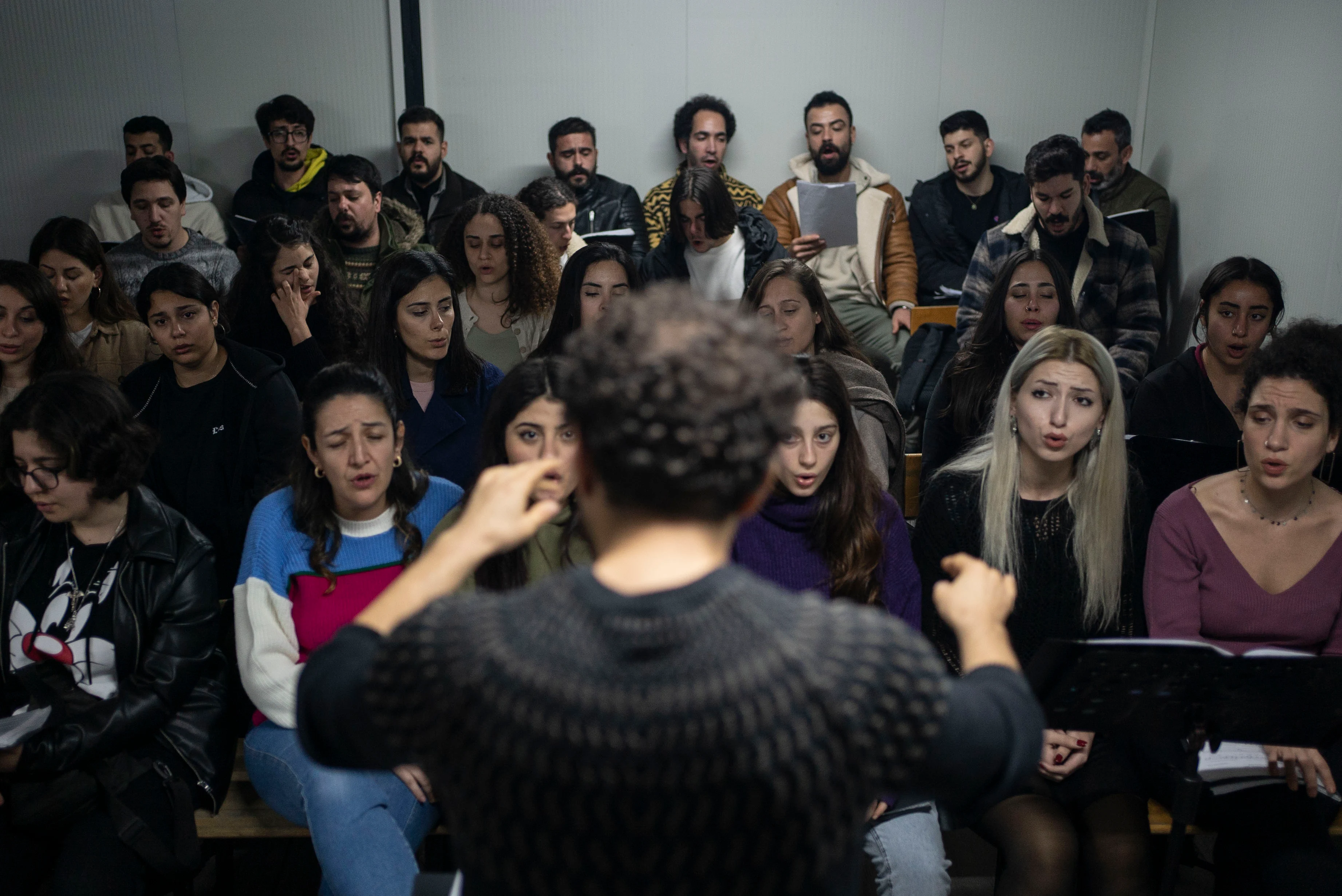
A cellist from the Hatay Academic Symphony Orchestra rehearses in a container in Antakya, southeast Turkey. (Credit: Cerise Sudry-Le Dû)
“And if you love me, watch out for yourself,” Yasemin Ek’s voice echoed in a container, harmonizing with the Hatay Academic Symphony Orchestra.
Navigating through puddles on a rugged path to reach this makeshift rehearsal venue did not deter the multilingual soprano from her polished appearance.
With carefully manicured nails, flawless makeup and impeccably styled hair, she presented herself with grace.
“Admittedly, these acoustic conditions aren’t ideal, and the tight quarters are less than comfortable,” she acknowledged with a smile. “But regardless, we must come together.”
 Ali Uğur conducts the Hatay Academic Symphony Orchestra rehearsing in a container in Antioch, southeast Turkey. (Credit: Cerise Sudry-Le Dû)
Ali Uğur conducts the Hatay Academic Symphony Orchestra rehearsing in a container in Antioch, southeast Turkey. (Credit: Cerise Sudry-Le Dû)
Founded in 2019 without support from the Antakya municipality or the Hatay province, the orchestra has struggled to find a rehearsal space.
Its members finally secured a stable venue in December 2022, only for it to collapse two months later in the devastating earthquake of Feb. 6, 2023. The disaster, which claimed 53,537 lives in Turkey, left little standing in Hatay province.
Antakya, particularly hard hit, is now mostly makeshift dwellings and prefabs, severely limiting options for the orchestra’s rehearsals.
Saving music
For the past few months, Yasemin Ek and approximately 50 musicians have been rehearsing within the confines of this sixty-square-meter container.
The space, inadequately insulated and cramped for the size of the orchestra, forces the musicians to huddle together, risking collisions of their bows with hurried movements. Yet, this inconvenience hardly fazes them.
Every week, they gather in a container camp to play their repertoire for five hours.
From Turkish, Armenian and Kurdish melodies, to classics like Bizet’s Carmen, the music echoes within their modest rehearsal space.
“We began returning here in September,” said conductor Ali Uğur. “About 70 percent of the orchestra and choir are now present.”
However, some members of the ensemble, typically comprising around a hundred musicians, remain absent. Their homes were destroyed, compelling them to relocate to other cities like Istanbul.
Despite the ongoing challenges in their hometown, they are gradually making their way back. Even those residing elsewhere make an effort to attend concerts.
“We had to resume rehearsals because making music is essential for our healing process,” Uğur said.
In the center, Uğur stood behind his music stand, conducting with the tip of his baton. His animated gestures occasionally caused his round glasses to slip.
The orchestra’s fate was sealed during an online meeting just weeks after the earthquake.
“We decided to press on because art has a healing power. And our city is in dire need of healing,” he said.
As both a conductor and a music teacher, he draws inspiration from the city’s resilience in the face of past earthquakes. “The people of Antakya have always rebuilt this city, and now it’s our turn,” he added.
Uğur himself completed his renovation just four months ago.
“The house where I was born and raised was destroyed. After the earthquake, my extended family — my father, mother, siblings, uncles, aunts and cousins — lived together in a tent for seven or eight months. There were so many of us that I didn’t get much sleep,” Uğur recounted.
A solidarity orchestra
The orchestra has transformed, serving as a tribute to those who perished in the earthquake.
Nestled to one side amidst stacked school tables, Can Düngüz concentrated on playing electronic percussion, a space-efficient alternative to a traditional drum kit.
“My brother taught me to play. He was the orchestra’s first percussionist,” he shared. “After losing him in the earthquake, I was asked to take his place. I agreed because I couldn’t bear to see anyone else in that role,” he said.
In addition to its diverse repertoire, the orchestra reflects the cultural richness of the city.
“Our soloist, Cansu, who tragically perished in the earthquake, was a member of the Antioch Greek Orthodox Church,” Uğur said. “We used to make music together. It’s not uncommon in Antakya, where a culture of coexistence prevails,” he added.
 Ali Uğur conducts the Hatay Symphony Orchestra choir rehearsing in a container in Antioch, southeast Turkey. (Credit: Cerise Sudry-Le Dû)
Ali Uğur conducts the Hatay Symphony Orchestra choir rehearsing in a container in Antioch, southeast Turkey. (Credit: Cerise Sudry-Le Dû)
Throughout the year, the orchestra performed charity concerts across the country and even in Germany.
“We raised awareness for Hatay and shared our voices,” Ek said. “But above all, it was about reconnecting through music with friends. We lost members of our orchestra, and everyone has endured trauma.”
Through these concerts, “we were able to provide instruments for numerous fine arts and music students whose own instruments were buried under the rubble,” the young soprano explained.
Another charity concert is scheduled for February in Istanbul, organized by the French and German consulates.
Despite not receiving an invitation to participate in the official commemorations marking the earthquake anniversary, all orchestra members are eager to contribute to the tributes in their own way. They plan to organize open-air performances on the day before and the day of the anniversary.
“As an Antakya native,” said young percussionist Düngüz, “I want to march, place carnations in the Orontes for my lost loved ones and sing a song in their honor.”
The rehearsal concluded with songs dedicated to the earthquake victims. Some were penned shortly after the disaster, while others featured lyrics that reflect its impact.
“It’s a mix of sadness and hope,” said Uğur. This sentiment is echoed in one of the choir’s last polyphonic renditions: “What a beautiful world; what a short life.”
This article was originally published in L'Orient-Le Jour. Translated by Sahar Ghoussoub.